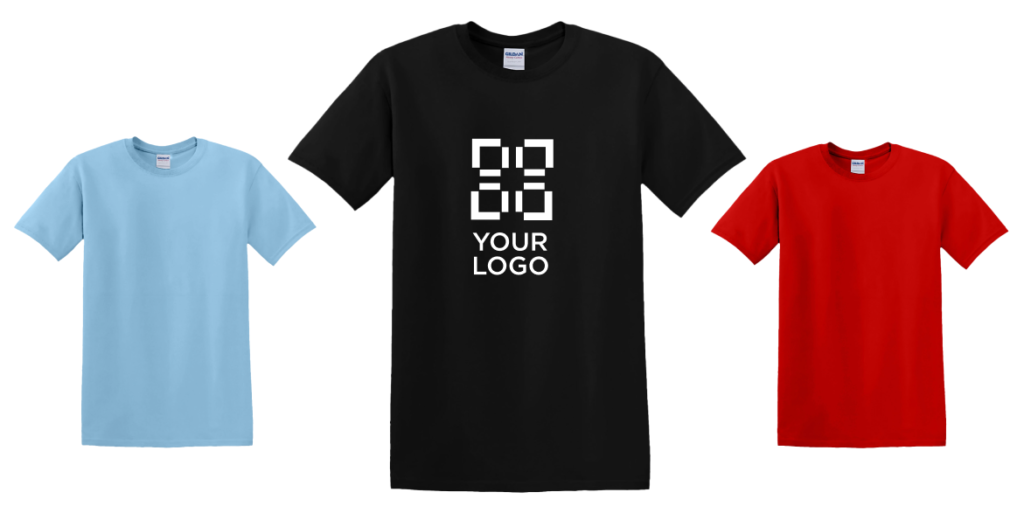Have you always dreamed of creating your own brand or designing a personalized t-shirt that nobody else has? Bringing your unique vision to life starts with one crucial step: choosing the right material. The fabric you select can make all the difference, transforming a good t-shirt into a great one that people will love to wear.
In this article, we’ll walk you through the best and most popular fabrics for custom t-shirts, highlighting their unique advantages and ideal uses. Whether you’re seeking ultimate comfort, exceptional durability, or a sustainable choice, we’ve got the insights you need.
Contents
Factors to consider when choosing the right material
Comfort
Comfort is key for t-shirts, ensuring they feel good against the skin and keep you cool.
Durability
Durability is essential that need to withstand frequent wear and washing. Fabrics like polyester, cotton-polyester blends, and heavyweight cotton offer excellent strength and longevity.
Weight
The weight of the fabric affects how the t-shirt feels and drapes. Lightweight fabrics are perfect for sportive clothes and sunny weather, while heavier fabrics are better for cooler weather.
Sustainability
Choosing eco-friendly materials helps reduce environmental impact. Fabrics such as organic cotton, recycled polyester and bamboo provide sustainable options without compromising quality.

Cotton
Cotton is a popular choice for custom t-shirts due to its comfort and versatility. This natural fiber is breathable, soft, and durable, making it perfect for everyday wear. There are various types of cotton fabrics available, including 100% cotton, organic cotton, and cotton blends. 100% cotton is pure and provides a classic, comfortable feel. Organic cotton is grown without harmful chemicals, making it an eco-friendly option. Cotton blends, which mix cotton with other materials like polyester, combine the best qualities of each fabric, such as increased durability and improved moisture-wicking properties.
Custom methods for cotton
Screen Printing
Screen printing involves creating a stencil (or screen) and applying layers of ink on the t-shirt.
Advantages:
- Durability: Produces vibrant, long-lasting prints that withstand many washes.
- Cost-Effective: Economical for large orders due to the scalability of the process.
- Versatility: Suitable for a wide range of designs and colors.
Best For: Bulk orders, promotional t-shirts, sports team uniforms.
Direct-to-Garment (DTG) Printing
DTG printing uses specialized inkjet technology to print designs directly onto the fabric.
Advantages:
- High Detail: Excellent for complex designs with many colors and fine details.
- No Minimum Order: Cost-effective for small batches or one-off prints.
- Soft Finish: Produces a soft print that feels integrated into the fabric.
Best For: Custom t-shirts with detailed graphics or photographs, small orders, personalized gifts.

Embroidery
Embroidery uses thread to stitch designs onto the t-shirt, creating a textured and professional look.
Advantages:
- Professional Appearance: Adds a high-quality, upscale look to the garment.
- Durability: Extremely durable and can withstand heavy washing and wear.
- Texture and Depth: Provides a unique, tactile quality that other methods can’t match.
Best For: Corporate apparel, logos, monograms.
Heat Transfer
Heat transfer involves printing a design onto a special transfer paper, then using heat and pressure to apply the design to the t-shirt.
Advantages:
- Flexibility: Great for full-color designs and gradients.
- Quick Turnaround: Faster production time compared to other methods.
- Low Setup Cost: Ideal for small runs and custom designs.
Best For: Events, custom designs, multi-color prints.

Polyester
Polyester is another excellent choice for custom t-shirts, known for its durability and resistance to wrinkles and shrinking. This synthetic fabric is lightweight, quick-drying, and holds its shape well, making it ideal for activewear and everyday use. In addition to standard polyester, there’s also recycled polyester, which is made from recycled plastic bottles, offering an eco-friendly alternative. Microfiber, a type of polyester with an ultra-fine weave, provides a smooth, soft texture and excellent moisture-wicking properties, perfect for athletic wear.
Custom Methods for Polyester
Sublimation Printing
Sublimation printing involves transferring dye onto the fabric using heat. The dye becomes gas and permeates the polyester fibers, creating a permanent and vibrant print.
Advantages:
- Vibrant Colors: Produces rich, vibrant colors that are permanent.
- Durability: The design becomes part of the fabric so that it won’t crack, fade, or peel.
- Soft Finish: Leaves no additional layer on top, maintaining the fabric’s softness and breathability.
Best For: Full-color and all-over designs, sports jerseys, activewear.
Screen Printing
Screen printing involves creating a stencil (or screen) and using it to apply layers of ink on the t-shirt. Special inks, like plastisol, are often used to ensure good adhesion to polyester.
Advantages:
- Durability: Produces durable prints that can withstand washing.
- Versatility: Suitable for a wide range of designs and colors, especially for large orders.
- Cost-Effective: Economical for bulk orders due to the scalability of the process.
Best For: Bulk orders, promotional t-shirts, corporate apparel.
Heat Transfer Printing
Heat transfer involves printing a design onto special transfer paper and then using heat and pressure to apply the design to the polyester t-shirt.
Advantages:
- Flexibility: Great for full-color designs and gradients.
- Quick Turnaround: Faster production time compared to some other methods.
- Low Setup Cost: Ideal for small runs and custom designs.
Best For: Events, custom designs, multi-color prints.

Vinyl Cutting
Vinyl cutting involves cutting out designs from colored vinyl sheets and then heat pressing them onto the t-shirt.
Advantages:
- Sharp Lines: Produces clean, sharp edges and bold designs.
- Durability: Vinyl is very durable and can last through many washes.
- Special Effects: Available in various finishes, such as matte, gloss, metallic, and glitter.
Best For: Simple, bold designs, text, numbers, and special effect prints.
Direct-to-Garment (DTG) Printing
DTG printing uses specialized inkjet technology to print designs directly onto the fabric. While traditionally used for cotton, advancements have made DTG viable for polyester with the use of pre-treatment solutions.
Advantages:
- High Detail: Excellent for complex designs with many colors and fine details.
- No Minimum Order: Cost-effective for small batches or one-off prints.
- Soft Finish: Produces a soft print that feels integrated into the fabric.
Best For: Custom t-shirts with detailed graphics or photographs, small orders and personalized gifts.

The Verdict
Cotton and polyester each have their good points, making them useful for different things. Cotton is soft, breathable, and eco-friendly, great for everyday wear and casual events. Polyester is very strong, keeps you dry, and dries quickly, making it perfect for active wear and sports.
Choosing the best fabric for your custom t-shirts depends on how you will use them, what you like, and the design you want. This blog post helped you to find the right fabric for your custom t-shirt.
Did you find the right fabric for your custom t-shirt? Check out the wide range of options we have at Wordans, to see which one is perfect for you! If you need some more inspiration take a look at our instagram @wearewordans












